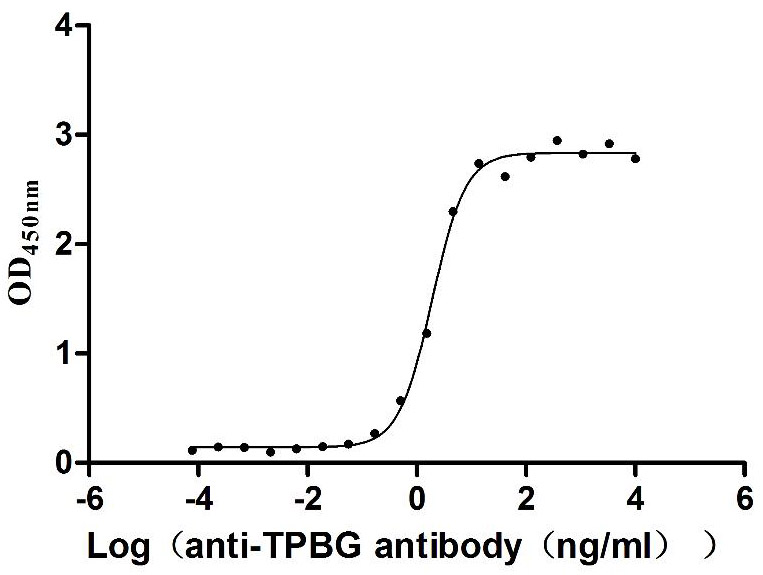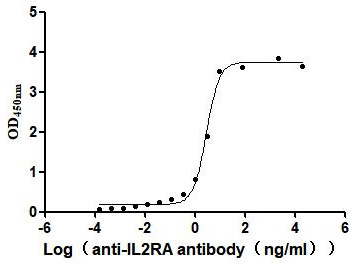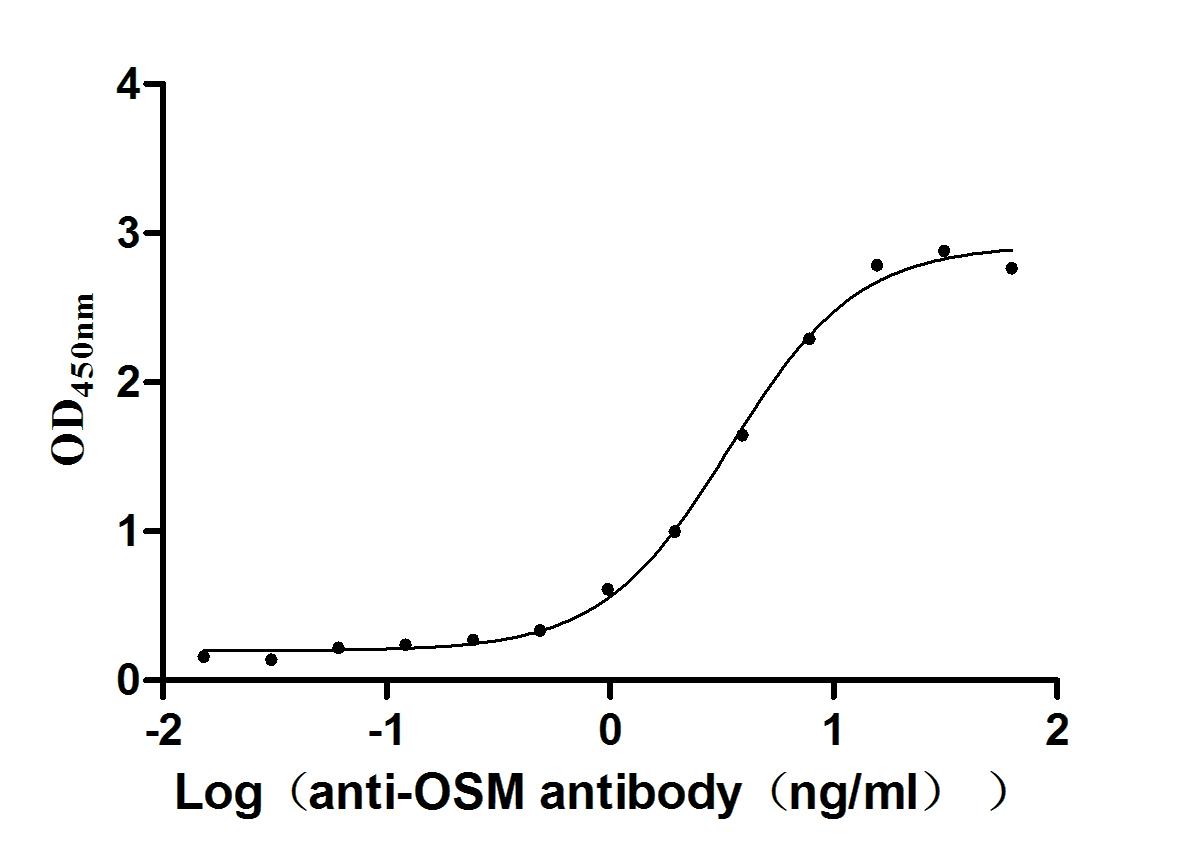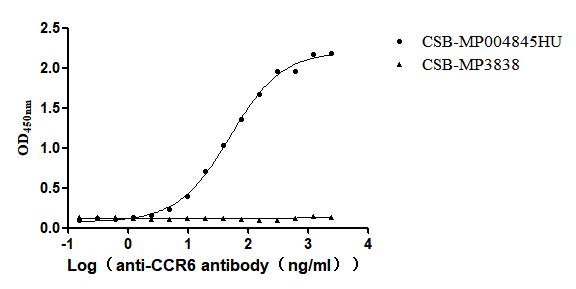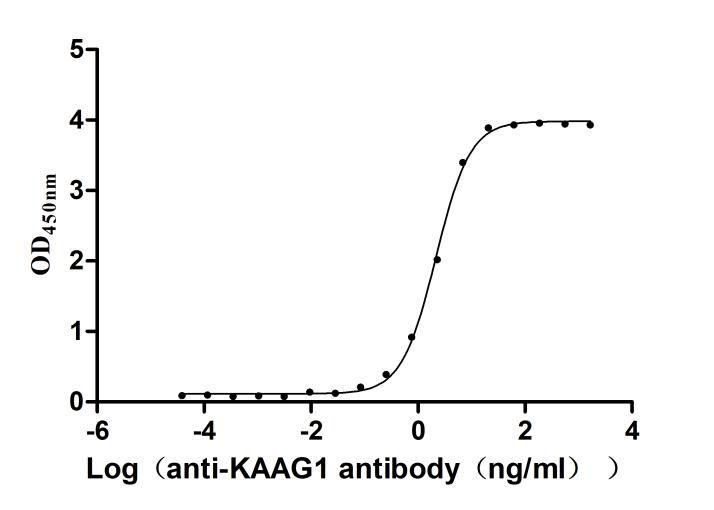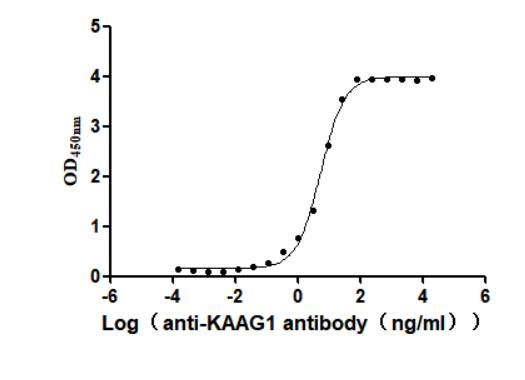Recombinant Human Adhesion G protein-coupled receptor E5 (ADGRE5)
-
货号:CSB-CF004972HU
-
规格:
-
来源:in vitro E.coli expression system
-
其他:
产品详情
-
基因名:CD97
-
Uniprot No.:
-
别名:ADGRE5; CD97; Adhesion G protein-coupled receptor E5; Leukocyte antigen CD97; CD antigen CD97
-
种属:Homo sapiens (Human)
-
蛋白长度:Full Length of Mature Protein
-
表达区域:531-835
-
氨基酸序列SSFAILMAHYDVEDWKLTLITRVGLALSLFCLLLCILTFLLVRPIQGSRTTIHLHLCICL FVGSTIFLAGIENEGGQVGLRCRLVAGLLHYCFLAAFCWMSLEGLELYFLVVRVFQGQGL STRWLCLIGYGVPLLIVGVSAAIYSKGYGRPRYCWLDFEQGFLWSFLGPVTFIILCNAVI FVTTVWKLTQKFSEINPDMKKLKKARALTITAIAQLFLLGCTWVFGLFIFDDRSLVLTYV FTILNCLQGAFLYLLHCLLNKKVREEYRKWACLVAGGSKYSEFTSTTSGTGHNQTRALRA SESGI
Note: The complete sequence including tag sequence, target protein sequence and linker sequence could be provided upon request. -
蛋白标签:N-terminal 10xHis-tagged
-
产品提供形式:Liquid or Lyophilized powder
Note: We will preferentially ship the format that we have in stock, however, if you have any special requirement for the format, please remark your requirement when placing the order, we will prepare according to your demand. -
缓冲液:Lyophilized from Tris/PBS-based buffer, 6% Trehalose, pH 8.0
-
储存条件:Store at -20°C/-80°C upon receipt, aliquoting is necessary for mutiple use. Avoid repeated freeze-thaw cycles.
-
保质期:The shelf life is related to many factors, storage state, buffer ingredients, storage temperature and the stability of the protein itself.
Generally, the shelf life of liquid form is 6 months at -20°C/-80°C. The shelf life of lyophilized form is 12 months at -20°C/-80°C. -
货期:Basically, we can dispatch the products out in 1-3 working days after receiving your orders. Delivery time may differ from different purchasing way or location, please kindly consult your local distributors for specific delivery time.Note: All of our proteins are default shipped with normal blue ice packs, if you request to ship with dry ice, please communicate with us in advance and extra fees will be charged.
-
注意事项:Repeated freezing and thawing is not recommended. Store working aliquots at 4°C for up to one week.
-
Datasheet & COA:Please contact us to get it.
相关产品
靶点详情
-
功能:Receptor potentially involved in both adhesion and signaling processes early after leukocyte activation. Plays an essential role in leukocyte migration.
-
基因功能参考文献:
- Biochemical features of the adhesion G protein-coupled receptor CD97 related to its auto-proteolysis and HeLa cell attachment activities PMID: 27641734
- High CD97 expression Correlates with Breast, Colorectal and Pancreatic Cancer. PMID: 28373465
- High expression of CD97 is associated with lymphatic metastasis in gastric cancer. PMID: 26233326
- This study indicated that the CD97 and CD55 proteins might be reliable biomarkers to predict the metastasis status and prognosis of intrahepatic cholangiocarcinoma patients. PMID: 28345461
- Knock down of CD97 led to an altered mechanical phenotype, reduced adhesion to a stromal layer and lower wildtype FLT3 expression. PMID: 26462154
- present study suggested that the expressions of CD97 antigen and decay accelerating factor(DAF) were both upregulated in human cervical squamous cell carcinoma PMID: 26107567
- CD97 promotes gastric cancer cell proliferation and invasion in vitro through exosome-mediated MAPK signaling pathway, and exosomal miRNAs are probably involved in activation of the CD97-associated pathway. PMID: 26034356
- we identify the specific isoforms of CD97, a novel pro-invasive glioma antigen, across histologic grades of glioma and within BTICs. We also demonstrate a trend towards increased CD97 expression among the classical and mesenchymal GBM subtypes. PMID: 25714433
- We conclude that CD97 is located in the SR and at the peripheral sarcolemma of human and murine skeletal muscle, where its absence affects the structure of the SR without impairing skeletal muscle function PMID: 24949957
- CD97 enhanced TIMP-2 secretion, leading to reduced MT-MMP-1 and -2 activities, impairing cell migration/invasion in vitro and lung macrometastasis in vivo and upregulating integrins. Both the NTF and the CTF of CD97 were required. PMID: 25174588
- These results provide the first experimental evidence that cd97 is a direct target of miR-126. PMID: 24274104
- study reports gene expression in skeletal muscle tissue of women with metabolic syndrome is enriched in inflammatory response-related genes; IL6R, HDAC9 and CD97 expression correlated negatively with insulin sensitivity; suggests a role for these 3 inflammatory genes in development of skeletal muscle insulin resistance in women PMID: 23771909
- Lysophosphatidylethanolamine utilizes LPA(1) and CD97 in a breast cancer cell line. PMID: 23838008
- CD97 expression promotes invasion and migration in glioblastoma multiforme, but has no effect on tumor proliferation. PMID: 23658650
- CD97 expression in human thyroid cancers correlated with LPA receptor and markers of aggressiveness including Ki67 and pAKT. PMID: 22797060
- CD97 small isoform not only supported gastric cancer local growth, but also promoted metastatic spread in orthotopically implanted mouse model. PMID: 22768192
- CD97 and CD55 showed high expression at the invasive front of gallbladder carcinoma. CD97 and CD55 expression was associated with high histologic grade, advanced pathologic T stage, clinical stage and positive venous/lymphatic invasion. PMID: 22547928
- binding of leukocytes to activated endothelium mediated by the interaction of CD97 with Thy-1 is involved in firm adhesion of polymorphonuclear cells during inflammation and may play a role in the regulation of leukocyte trafficking to inflammatory sites. PMID: 22210915
- we conclude that the possible upregulation of CD97 mediated by WT1 promotes cellular invasiveness-one of the most characteristic and challenging aspects of glial tumor cells. PMID: 22313360
- CD97 functioned to mediate invasion in prostate cancer cells, by associating with lysophosphatidic acid receptor 1 (LPAR1), leading to enhanced LPA-dependent RHO and extracellular signal-regulated kinase activation. PMID: 21978933
- expression of the wild type - but not the GPS cleavage-deficient CD97 up-regulates the expression of N-cadherin, leading to Ca(++)-dependent cell-cell aggregation. PMID: 21156175
- Elevated expression of CD97 and its ligand CD55 at the invasion front correlate with tumor recurrence and metastasis, and CD95 may be a poor prognostic factor for rectal adenocarcinoma. PMID: 20339853
- the tumor promoting role of CD97 small isoform in cancer progression PMID: 20428763
- complex cellular expression programmes rather than activation modes regulate the expression of EGF-TM7 receptors in macrophages PMID: 20167235
- CD97 expression correlates with dedifferentiation, migration, and invasion in colorectal tumor cell lines PMID: 12414513
- coengagement of alpha5beta1 and chondroitotin sulfate proteoglycan by CD97 synergistically initiates endothelial cell invasion PMID: 15576472
- Findings suggest that CD97(EGF) may play a role in the development and invasion of gastric carcinomas. PMID: 16273233
- CD55 engagement with its natural ligand CD97 can act as a potent costimulator of human CD4+ T cells, resulting in cellular activation and promoting enhanced proliferation and cytokine secretion. PMID: 16818763
- enhanced CD97 expression in colorectal cancer cells is regulated independent of beta-catenin/Tcf-4, and is thus not a direct target of the canonical Wnt pathway PMID: 16929497
- CD55 may simultaneously regulate both the innate and adaptive immune responses and can also regulate complement when bound to CD97. PMID: 17449467
- EGF-TM7 pre-mRNAs also undergo the rare trans-splicing, leading to the generation of functional chimeric receptors. PMID: 18267122
- Sp1 and Sp3 over-expression activates CD97 promoter activity in HEK293 cells. PMID: 18329191
- CD97 is present on all lymphocytes in blood and lymphoid tissue. Expression of CD97 on B cells was lower compared to T and NK cells and did not differ between B-cell subsets. PMID: 19428565
- CD97-mFc can adopt two different conformations; one capable of auto-proteolysis and the other not. PMID: 19737555
- CD97 is expressed in all types of macrophages and dendritic cells except for microglia, in most T cells but only a few B cells, in smooth muscle cells, and in a restricted set of thyroid and gastrointestinal carcinomas. PMID: 11380941
显示更多
收起更多
-
亚细胞定位:Cell membrane; Multi-pass membrane protein.; [Adhesion G protein-coupled receptor E5 subunit alpha]: Secreted, extracellular space.
-
蛋白家族:G-protein coupled receptor 2 family, LN-TM7 subfamily
-
组织特异性:Broadly expressed, found on most hematopoietic cells, including activated lymphocytes, monocytes, macrophages, dendritic cells, and granulocytes. Expressed also abundantly by smooth muscle cells. Expressed in thyroid, colorectal, gastric, esophageal and p
-
数据库链接:
HGNC: 1711
OMIM: 601211
KEGG: hsa:976
STRING: 9606.ENSP00000242786
UniGene: Hs.466039
Most popular with customers
-
Recombinant Mouse Tyrosine-protein kinase Mer (Mertk), partial (Active)
Express system: Mammalian cell
Species: Mus musculus (Mouse)
-
Recombinant Macaca fascicularis Trophoblast glycoprotein (TPBG), partial (Active)
Express system: Mammalian cell
Species: Macaca fascicularis (Crab-eating macaque) (Cynomolgus monkey)
-
Recombinant Human Interleukin-2 receptor subunit alpha (IL2RA), partial (Active)
Express system: Mammalian cell
Species: Homo sapiens (Human)
-
Recombinant Human Oncostatin-M (OSM), partial (Active)
Express system: Mammalian cell
Species: Homo sapiens (Human)
-
Recombinant Human C-C chemokine receptor type 6(CCR6)-VLPs (Active)
Express system: Mammalian cell
Species: Homo sapiens (Human)
-
Recombinant Human Dipeptidase 3(DPEP3), partial (Active)
Express system: Mammalian cell
Species: Homo sapiens (Human)
-
Recombinant Human Kidney-associated antigen 1(KAAG1) (Active)
Express system: E.coli
Species: Homo sapiens (Human)
-
Recombinant Human Kidney-associated antigen 1(KAAG1) (Active)
Express system: Baculovirus
Species: Homo sapiens (Human)



